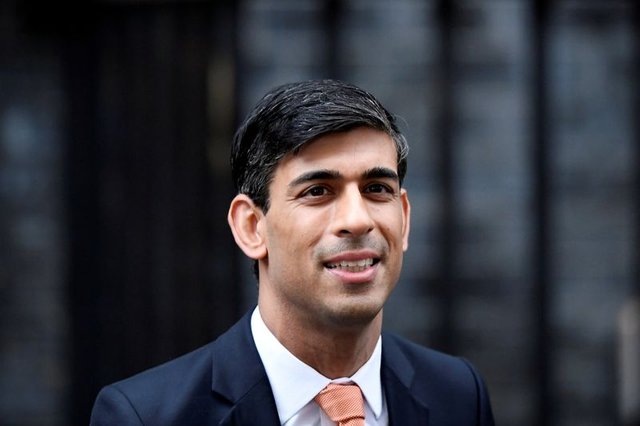UK's Sunak looking at ways to relax spending limit
FILE PHOTO: Newly appointed Britain's Chancellor of the Exchequer Rishi Sunak leaves Downing Street in London  FILE PHOTO: Newly appointed Britain's Chancellor of the Exchequer Rishi Sunak leaves Downing Street in London By William Schomberg and Kylie Mac
FILE PHOTO: Newly appointed Britain's Chancellor of the Exchequer Rishi Sunak leaves Downing Street in London By William Schomberg and Kylie Mac
Lellan
LONDON (Reuters) - British finance minister Rishi Sunak, under pressure to fund the fight against the coronavirus and meet election promises in this week's budget, has said he is looking at possible changes to rules which could allow him to spend more.
Sunak told the Sunday Telegraph newspaper he was studying "with interest" proposals to reclassify some government spending as investment as he puts the finishing touches Britain's first post-Brexit budget on Wednesday.
Such a change would give him more room for maneuver with spending on public services, including on health.
Wednesday's budget was originally billed as a chance for Prime Minister Boris Johnson, fresh from December's election triumph, to begin to meet his promise to "level up" Britain's struggling regions.
But the focus on the spread of the coronavirus means it will delay announcing full details of its plans for new railways, roads and other infrastructure investment.
In interviews on Sunday, Sunak repeatedly declined to confirm that he would stick with the fiscal rules set by his predecessor Sajid Javid who came under pressure from Johnson's advisors to spend more.
But the 39 year-old former Goldman Sachs (NYSE:GS) banker who has been in his job for less than a month, said he was not about to abandon the discipline of previous Conservative Party finance ministers whose tight grip on spending slashed Britain's budget deficit since the global financial crisis.
"That means I can sit here today and say I will invest what it takes to get us through this," he told BBC television, referring to the coronavirus outbreak.
Sunak said he would offer help to companies suffering short-term cash-flow problems and he was in touch with Bank of England Governor Mark Carney about the possible economic hit.
The Bo
E has said it needs to see more evidence before of the virus' impact before cutting interest rates like the U.S. Federal Reserve. Other options include reviving incentives for bank lending to companies.
SPENDING SOLUTION?
Sunak has been expected to relax a limit on day-to-day spending which was set by Javid before he unexpectedly quit last month after a row with Johnson over advisors.
The toughest of those rules is a pledge to balance so-called current spending with tax revenues within three years.
Media reports have said Sunak might reclassify some public spending on health and education services as investment which is subject to a less restrictive rule, avoiding cuts to other services or tax increases.
Sunak told the Sunday Telegraph he wanted "lower rates of tax" during his time in office.
He said he was looking at objections to transaction taxes such as Britain's stamp duty which is applied to the purchase of properties, suggesting it could be changed in a future budget.
Sunak also said there was no need to extend the Brexit transition period, which is due to end on Dec. 31, describing the coronavirus as a short-term challenge.
Asked about Johnson's "leveling up" plans, Sunak said he would launch a review of the way that public investment decisions are taken, which critics say favors London and the south, and he said a fifth of finance ministry staff would eventually work in northern England.